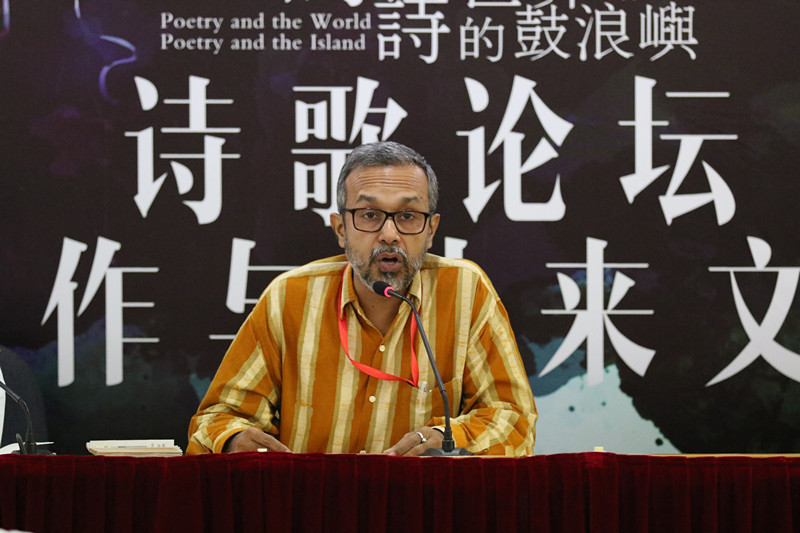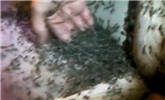墨普德教授:外来话语对创作的影响不局限于异国元素
2016年10月22日 21:11
来源:凤凰文化
外来话语对一个人创作的影响不局限于其作品是否包含异国元素。在全球化的今天,外国人或外来影响对诗歌创作到底意味着什么呢?就算只看一个民族,我们也可以找到其他诗人或作家对一个人诗歌创作留下的痕迹。

个人化写作与外来文化影响
10月21日上午,2016凤凰·鼓浪屿诗歌节第二天,主题为“个人化写作与外来文化影响”的诗歌国际论坛在鼓浪屿举办。诗人赵野,赵四,李少君,树才,李元胜,默默,韩庆成,廖伟棠,林于弘、黄冈、加拿大诗人洛尔娜·克罗奇(Lorna Crozier),英国诗人李道(Richard Bruns),印度汉学学者、诗人普利亚达西·墨普德教授、韩国翻译家金泰成等人在论坛做出精彩又有见地的发言。论坛由诗人、翻译家、评论家汪剑釗和诗人北塔主持。
鼓浪屿拥有“万国建筑博览”美誉,东方文化与西方文化交会于此,闽南文化与外来文化共融于此。“鼓浪屿女婿”林语堂自评“两脚踏东西文化,一心评宇宙文章”。于诗人而言,外来文化将如何影响个人写作?作为“世界人”的诗人,一方面孜孜不倦地从自身文化中汲取养分,另一方面又无时不刻不体会着全球化带来的“文化震撼”,从而形成观念的冲突、矛盾、变形、融合、促进,进而可能形成写作的自我革新。

印度诗人墨普德教授
以下为墨普德教授的发言实录:
全球各地的著名诗人总是不断受到外来文学影响的。泰戈尔也不例外,他不仅受到了西方诗人的影响,古印度知识宝库《奥义书》中的哲学也让他受益匪浅。他的一些诗歌灵感源自苏格兰和爱尔兰旋律;他的一些两行诗则受到了日本俳句的启发。泰戈尔的所有作品都蕴含着他的母语——孟加拉语的形式美感。另一位孟加拉诗人纳扎鲁尔的创作也受到了西亚文化和普世主义的重大影响,后者在泰戈尔的作品中也有表现。外来话语对一个人创作的影响不局限于其作品是否包含异国元素。在全球化的今天,外国人或外来影响对诗歌创作到底意味着什么呢?就算只看一个民族,我们也可以找到其他诗人或作家对一个人诗歌创作留下的痕迹。
就我个人而言,我十岁就开始作诗了。我的母语是孟加拉语,这门语言贡献了涵盖无数角度的丰富文学作品。我的诗歌最初受泰戈尔风格的影响,主要表现在对大自然的礼赞上。在后来的学生时代,我简直成了小纳扎鲁尔。在我学习中国文化的过程中,我的诗歌受到了中国古代哲学的影响。对中国语言文化的了解丰富了我的诗歌创作,我甚至还用中文作了几首唐诗,因此我的很多诗歌都有中国文化象征。早年间我还用孟加拉语翻译了大量的唐诗。近年来,我的一些两行诗开始使用日本传统诗体俳句的5-7-5音节模式。我的早期诗歌也受到了俄罗斯诗人普希金的影响。俄罗斯广阔无垠的草原和孟加拉农村绵延数里的绿油油稻田同样对我有很大的吸引力,以至于我的许多诗歌都是在诉说着开阔的空间。但在全球化的物质狂飙下,这些开阔空间正在快速消散。我的诗有时在本质上是一种政治讽刺。这种讽刺往往直击要害,质疑日常政治话语中自鸣得意的爱国主义或伪世俗主义是否成立。在全球几乎所有有人文情怀的敏感诗人那里,这种诗意的话语都经常出现或者再现。
Inthe Quest for a Universal Poetic Genre
—Prof. PriyadarsiMukherji
J.N.U.,New Delhi, India
Poets across the world with extraordinary reputation have invariablybeen influenced by foreign literature. Our revered poet Tagore too wasinfluenced not only by western poets but also by the philosophy of theUpanishads, a grand repository of ancient Indian knowledge. Some of Tagore’ssongs have been influenced by Scottish and Irish melodies. Likewise, some ofhis couplets were influenced by the Japanese Haiku. The entire corpus ofTagore’s works attained its charm in its original form in Bengali. AnotherBengali poet Kazi Nazrul Islam’s compositions at times were heavily influencedby the West Asian cultures as well as the universalism as reflected in theworks of Tagore. The discourse of foreign influence on one’s personalcomposition is not restricted by whether the writings contain foreigncomponents. In a globalized world, what do we, after all, mean by foreign, orforeign influence on one’s poetic composition? Within a single ethnicframework, one can find the traces of other poets or writers in one’s poeticcreation.
In my case, I have been a poet since I was ten. My mother tongue isBengali, the language in which some of the richest literature have been createdin terms of all dimensions. My poetry was initially influenced by the genres ofTagore. The eulogy of Nature was one such aspect. Later during my student days,my poetry became a tiny carrier of Nazrul’s thoughts. My poems got influencedby the ancient Chinese philosophy at a time when I had been a student ofChinese culture. The knowledge of Chinese language and culture enriched mypoetic creation to the extent that I also wrote poems in Chinese in a Tangrhythmic pattern. I translated a number of Tang poems into Bengali in my earlyyears. Many of my poems were marked with Chinese cultural symbolisms. In recentyears, some of my couplets began incorporating the 5-7-5 syllabic pattern ofHaiku, typical of the Japanese tradition. In the early days, my poems were alsoinfluenced by the Russian poet Pushkin. The vast wilderness of the Russiansteppes and the green paddy fields for miles in the countryside ofBengal—appealed me so much that many of my poems talk of the open space that isfast getting depleted by the wild drive for material development in this worldin the name of globalization. My poems sometimes have been a political satirein their very essence—to a great extent with hard-hitting phrases, seeking toquestion the validity of self-assumed patriotism or pseudo-secularism existingin our daily political discourse. Such poetic phrases often intermingle withthe genre that have been generated and regenerated in the thoughts of almostall sensitive humanist poets of the world. 

[责任编辑:冯婧 PN041]
责任编辑:冯婧 PN041
- 好文

- 钦佩

- 喜欢

- 泪奔

- 可爱

- 思考


凤凰文化官方微信
视频
-

李咏珍贵私人照曝光:24岁结婚照甜蜜青涩
播放数:145391
-

金庸去世享年94岁,三版“小龙女”李若彤刘亦菲陈妍希悼念
播放数:3277
-

章泽天棒球写真旧照曝光 穿清华校服肤白貌美嫩出水
播放数:143449
-

老年痴呆男子走失10天 在离家1公里工地与工人同住
播放数:165128
图片新闻






















